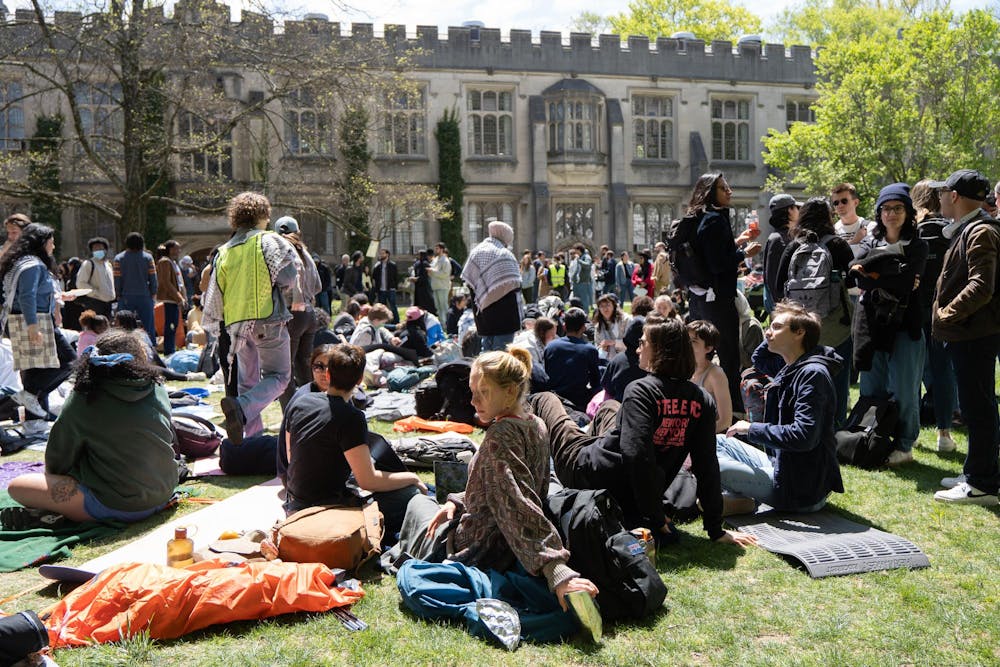Over the past week, landmark cases of student activism have swept across America. Advocacy at Columbia has emerged at the forefront of the headlines when over 100 students were arrested at a pro-Palestinian student demonstration on charges of trespassing. Across the nation, similar encampments have also emerged at the University of California, Berkeley, Massachusetts Institute of Technology, Tufts University, and Emerson College.
As of this morning, protesters calling for Gaza solidarity and University divestment from Israel have also stood their ground on McCosh courtyard. Over the past day, Princeton Public Safety (PSAFE) has conducted arrests, suppressed calls for change, and intimidated organizers as the University undertakes its harshest action yet against protester voices. However, this robust outpouring of student voices is a rare sight on Princeton’s campus.
Student advocacy at Princeton is notoriously inactive. The passive state of activism principally derives from a culture of institutional insulation that is perpetuated through different aspects of the University’s geographic, socioeconomic, and cultural environment. Although today’s encampment and the outcropping of solidarity represents a step in the right direction, the culture of the institution needs to fundamentally shift. In order to reignite a collective sense of social action, it is imperative that Princeton students recognize the “educational enclosure” that encompasses us, and that the University recognize the dire need for student voices and organized protest amid the nationwide suppression of free speech.
Princeton’s history is marked by decades of student activism. In recent years, undergraduates and graduates alike have marched for University divestment, rallied to call attention to sexual misconduct, and organized sit-ins to combat a legacy of anti-Black racism. Over the past year, students have undertaken numerous walkouts, protests, and public demonstrations to reiterate demands for an end to the ongoing bloodshed in Gaza and call for divestment from Israel. The present encampment is a salient reminder of the persistence of the movement. On several occasions, this advocacy has forced the administration to engage in discourse, respond to criticisms, and enact change accordingly, albeit infrequently. But more broadly, the state of activism among the student body is severely lacking.
As columnists have observed time and time again, Princeton’s student body has historically been not only apolitical, but deeply apathetic. Despite the popularity of Politics and SPIA majors among recent graduating classes, most Princeton students have remained content to stay on the sidelines. Although former University President William G. Bowen once described the University as a “value-laden institution,” values of Princeton students seldom translate into legitimate protest and demands for change. In the rare and isolated instances when organized protests do occur on campus, they tend to be fragmented and typically derive from identity-based organizations as opposed to a unified campus-wide front. Compared to other institutions of higher education, many activist movements at Princeton suffocate due to the isolated state of the student body.
It’s no secret that the University is insulated within the small suburban town of Princeton, New Jersey. Within the confines of the colloquially termed “Orange Bubble,” the majority of undergraduates will spend all four years clustered away in on-campus housing. Barring the occasional excursion or day-trip via the Dinky train, students will rarely venture more than a few blocks beyond Nassau Street during the school semester. As a result, it is hardly surprising that students report feeling isolated within the Bubble, for more reasons than one.
In addition to the physical location, the prevailing sense of “enclosure” that activist groups may experience within the Orange Bubble is enhanced by numerous quasi-cultural and institutional factors include the layers of bureaucracy and the cloistered environment of privilege. For activists who are looking to foster dialogue, voice critical opinions, or organize rallies, bureaucratic hurdles and lengthy internal approval processes can easily stifle grassroots movements. The wealth and privilege of Princeton — both within and surrounding the institution — also contribute to this atmosphere of detachment from greater societal issues. Accordingly, this may also foster a lack of urgency for activists who are seeking communal change. Without external input, a climate of insularity can solidify and even become self-sustaining.
A prevailing sense of institutional isolation can easily calcify over time, especially at a school like Princeton where most of its resources are concentrated in the undergraduate student body. The University’s professional schools and graduate study programs are relatively limited. Consequently, undergraduate activist movements may feel even more disconnected from external influence in such a tightly controlled and curated environment. As a result, future attempts for organized protest may be undermined by a predominant sense of student futility amid the greater geopolitical forces. Social movements for advocacy risk burning out in the long term.

In order to promote advocacy at Princeton, students must first learn to “pop the bubble” of the University that currently suffocates activist movements and dissuades organized protest. If Princeton truly means to imbue classes with a passion for service and civic engagement, then it must actively urge and exhort students to become involved in calls for change. In order to reaffirm commitment to activism, undergraduates must advocate for change, both within and beyond the gates of Nassau Hall.
Although today’s encampment represents a significant and monumental stride in campus activism, the culture of the Orange Bubble must fundamentally shift in order to ensure long term change. Engagement with external organizations and mentorship, increased organization of on- and off-campus events, and strategic utilization of social media to document protests may be the first steps in re-instituting a communal desire for change within the campus community. As of now, the fate of activism remains to be seen, but through engaged and concentrated efforts, student advocacy may be reignited.
Wynne Conger is a first-year and prospective SPIA major from Bryn Mawr, PA. She is an Associate Opinion editor and can be reached over email at wc2918[at]princeton.edu. Her column is titled “Popping the Bubble”









